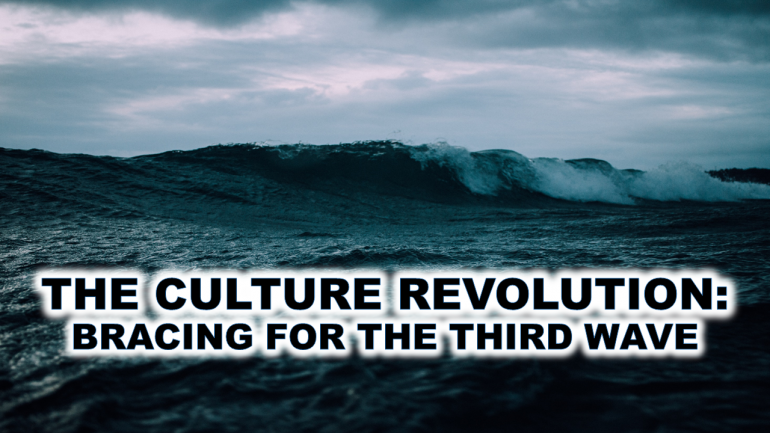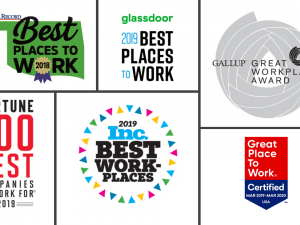
American businesses are experiencing a cultural tsunami.
A tsunami is a series of overwhelming ocean waves caused by an underwater earthquake, volcanic eruption or landslide. The triggering event causes a displacement of water along with multiple waves that quickly travel inland and dramatically increase in height when hitting the shoreline.
American businesses are experiencing a culture tsunami that is radically changing the business and employee experience landscape. It will lead to the cleansing of organizations that fail to prepare for the culture tsunami. Two waves have hit the workplace with bigger ones yet to arrive.
The First Wave
It could be said the triggering event occurred in April 1984 when the book, “The 100 Best Companies to Work for in America,” was published by Robert Levering and Milton Moskowitz. The findings in this book led to additional books and articles, along with Levering’s founding of the Great Place to Work Institute.
The research revealed a direct correlation between high levels of trust in an organization and their financial performance. The stock performance of great workplace companies outperformed the S&P 500 by 300%. This demolished the myth that soft skills had no place in business.
During the research for their first book, Levering and Moskowitz found that most company cultures were not great. In fact, they were bad. Their findings were too important not to share with corporate America. Not only were great workplaces good for the employee experience and the bottom-line, it was good for customers, suppliers and the community.
This was the first wave.
The Second Wave
The Great Place to Work Institute’s footprint began to grow with their annual Fortune 100 Best Places to Work for in America. Each year, the list was, and still is, Fortune’s most popular issue.
The Institute managed the process of determining the 100 winners based on the GPTW Trust Model. There was an increasing demand among organizations who wanted to transform their culture and make Fortune’s “great” list.
Demand for making the list is based on the fact people want to work for companies with great workplaces. With the evolution of worker expectations, organizations began transforming their culture to attract the best talent.
Due to the high demand and the limit of 100 winners, the Institute began offering many other lists besides the Fortune program. The innovative GPTW Certified program was also introduced.
A flood of company culture consulting firms began cropping up, as well as new best workplace lists, including Inc., Forbes, Gallup, Best Companies Group, Glassdoor, Indeed, Fast Company, People Magazine, Top Workplaces, CultureAmp, Energage, Best Christian Workplace Institute, Working Mother Magazine, Outside Magazine, among others.
There are also best workplace lists for Millennials, Baby Boomers, women, health care, diversity, financial services, African Americans, candidate experience, parents, world’s best, giving back, retail industry, and many, many more.
This was the second wave.
The Third Wave is Coming
The third wave is about to hit, and companies are starting to scramble for high ground.
Our economy is finally recovering from the Great Recession. The job market is hot. Unemployment is low. Millennials have higher expectations for their culture. They expect high levels of trust. They demand to be treated with dignity and respect.
Why do Millennials have higher workplace demands? One reason is they observed their Baby Boomer parents sacrifice their personal lives for their company that had little regard for their families. They felt the impact of their parents being laid off and its tragic impact on the family.
In our current business climate, failing to create a positive employee experience will lead to disaster. It will be difficult to attract and retain the best talent. Since the job market is hot, creating a great place to work is no longer an option – it’s a necessity.
If your company is not transforming the culture, it might be too late. Because of the improved job market, employees are looking for better places to work. There is a battle brewing for the best talent and only great workplace companies will win.
How to Survive the Third Wave
To create and sustain a successful company, your people strategy must be innovative and employee-centric. There is not one recipe to create a great place to work. One thing is certain; the CEO must drive the process. The people department should be involved but they are not the driver. Executives and leaders are also essential to the reformation of a culture. Executives who do not agree with the importance of culture should be respectfully managed out of the organization.
Perks Are Not the Answer
There is a lot of news coverage on the latest company perks. Perks are the Millennials workplace crack. The workplace revolution, however, is more than perks. Perks are simply the icing on the cake.
You might find it interesting, however, to see a list of perks currently being offered across America.
Perks are Workplace Crack
Just for kicks, here is a list of perks being offered by employers across the country.
Cafes, restaurants, coffee shops, full-service kitchens, fitness centers, basketball and tennis courts, yoga, daycare, spa treatments, massages, meditation sessions, safe rooms, quiet rooms, ping-pong, bowling, foosball, air hockey, shuffle boards, shuttle services, dry cleaning, laundry rooms, bicycle repair, unlimited vacation, car washes, theaters, on-site doctors, snacks, sabbaticals, beer, wine, video games, haircuts and mini golf.
Although the perks are nice, it does not guarantee you will create a successful, attractive and enduring culture.
The Trust Factor
Based upon the exhaustive search by GPTW, trust is the secret sauce of a great company. Employees want to be treated with respect. They need to work for an organization that shares their values and operates with the highest of ethical standards. Treating employees with dignity is non-negotiable.
They are looking for a place that openly communicates to their people.
If your company is not meeting these essential needs, your business will be short-lived. If you provide the best in compensation, benefits and perks, yet treat your employees poorly, your company will eventually go out of business.
The People Department is the Most Important Function
These tsunami warnings are catapulting the people function into the board room. Simply being present in the board room is not enough. Next to the CEO, the CPO function is now the most important executive role in the company. Since people are at the center of all functions, the CPO role is more important than the COO, CFO, CMO, CIO or CAO. This is not an arrogant position. It’s simple. People should be the focus of your company.
Jack Welch, the former CEO of General Electric recently stated, “Human resources, without question, is the number one or number two most important function in a company. I happen to believe HR is number one.” This is a significant statement coming from Welch. Based on his dubious history as a people manager, Welch must have had an epiphany later in life. While at GE, he did not have a great reputation of caring for employees. Time has a way of crystallizing your philosophy on life.
The CPO Should Report to the CEO
And finally, if your CPO/CHRO does not report directly to the CEO, your organization will likely be one of the casualties of the tsunami. Do not make your people function report to the CFO, COO, CLO, CMO, or any other executive alphabet combination. It should report to the top, otherwise, the people function is a waste of time.
Who Will Make It?
It will be interesting to see how the third wave will change the workplace landscape and which companies will go out of business. I can hear the rumble of the third wave in the distance.
Photo by Tim Marshall on Unsplash




